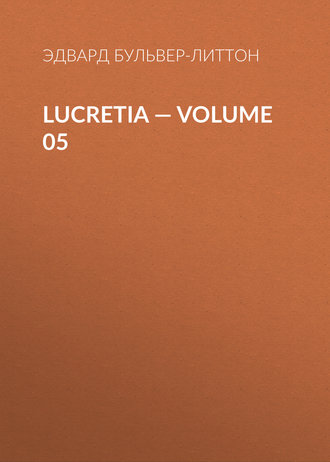
Эдвард Бульвер-Литтон
Lucretia — Volume 05
CHAPTER XIV
NEWS FROM GRABMAN
That day, opening thus auspiciously to Beck, was memorable also to other and more prominent persons in this history.
Early in the forenoon a parcel was brought to Madame Dalibard which contained Ardworth's already famous book, a goodly assortment of extracts from the newspapers thereon, and the following letter from the young author:—
You will see, by the accompanying packet, that your counsels have had weight with me. I have turned aside in my slow, legitimate career. I have, as you desired, made "men talk of me." What solid benefit I may reap from this I know not. I shall not openly avow the book. Such notoriety cannot help meat the Bar. But liberavi animam meam,—excuse my pedantry,—I have let my soul free for a moment; I am now catching it back to put bit and saddle on again. I will not tell you how you have disturbed me, how you have stung me into this premature rush amidst the crowd, how, after robbing me of name and father, you have driven me to this experiment with my own mind, to see if I was deceived when I groaned to myself, "The Public shall give you a name, and Fame shall be your mother." I am satisfied with the experiment. I know better now what is in me, and I have regained my peace of mind. If in the success of this hasty work there be that which will gratify the interest you so kindly take in me, deem that success your own; I owe it to you,—to your revelations, to your admonitions. I wait patiently your own time for further disclosures; till then, the wheel must work on, and the grist be ground. Kind and generous friend, till now I would not wound you by returning the sum you sent me,—nay, more, I knew I should please you by devoting part of it to the risk of giving this essay to the world, and so making its good fortune doubly your own work. Now, when the publisher smiles, and the shopmen bow, and I am acknowledged to have a bank in my brains,—now, you cannot be offended to receive it back. Adieu. When my mind is in train again, and I feel my step firm on the old dull road, I will come to see you. Till then, yours—by what name? Open the Biographical Dictionary at hazard, and send me one. GRAY'S INN.
Not at the noble thoughts and the deep sympathy with mankind that glowed through that work, over which Lucretia now tremulously hurried, did she feel delight. All that she recognized, or desired to recognize, were those evidences of that kind of intellect which wins its way through the world, and which, strong and unmistakable, rose up in every page of that vigorous logic and commanding style. The book was soon dropped, thus read; the newspaper extracts pleased even more.
"This," she said audibly, in the freedom of her solitude, "this is the son I asked for,—a son in whom I can rise; in whom I can exchange the sense of crushing infamy for the old delicious ecstasy of pride! For this son can I do too much? No; in what I may do for him methinks there will be no remorse. And he calls his success mine,—mine!" Her nostrils dilated, and her front rose erect.
In the midst of this exultation Varney found her; and before he could communicate the business which had brought him, he had to listen, which he did with the secret, gnawing envy that every other man's success occasioned him, to her haughty self-felicitations.
He could not resist saying, with a sneer, when she paused, as if to ask his sympathy,—
"All this is very fine, belle-mere; and yet I should hardly have thought that coarse-featured, uncouth limb of the law, who seldom moves without upsetting a chair, never laughs but the panes rattle in the window,—I should hardly have thought him the precise person to gratify your pride, or answer the family ideal of a gentleman and a St. John."
"Gabriel," said Lucretia, sternly, "you have a biting tongue, and it is folly in me to resent those privileges which our fearful connection gives you. But this raillery—"
"Come, come, I was wrong; forgive it!" interrupted Varney, who, dreading nothing else, dreaded much the rebuke of his grim stepmother.
"It is forgiven," said Lucretia, coldly, and with a slight wave of her hand; then she added, with composure,—
"Long since—even while heiress of Laughton—I parted with mere pride in the hollow seemings of distinction. Had I not, should I have stooped to William Mainwaring? What I then respected, amidst all the degradations I have known, I respect still,—talent, ambition, intellect, and will. Do you think I would exchange these in a son of mine for the mere graces which a dancing-master can sell him? Fear not. Let us give but wealth to that intellect, and the world will see no clumsiness in the movements that march to its high places, and hear no discord in the laugh that triumphs over fools. But you have some news to communicate, or some proposal to suggest."
"I have both," said Varney. "In the first place, I have a letter from Grabman!"
Lucretia's eyes sparkled, and she snatched eagerly at the letter her son- in-law drew forth.
LIVERPOOL, October, 1831.
JASON,—I think I am on the road to success. Having first possessed myself of the fact, commemorated in the parish register, of the birth and baptism of Alfred Braddell's son,—for we must proceed regularly in these matters,—I next set my wits to work to trace that son's exodus from the paternal mansion. I have hunted up an old woman-servant, Jane Prior, who lived with the Braddells. She now thrives as a laundress; she is a rank Puritan, and starches for the godly. She was at first very wary and reserved in her communications; but by siding with her prejudices and humours, and by the intercession of the Rev. Mr. Graves (of her own persuasion), I have got her to open her lips. It seems that these Braddells lived very unhappily; the husband, a pious dissenter, had married a lady who turned out of a very different practice and belief. Jane Prior pitied her master, and detested her mistress. Some circumstances in the conduct of Mrs. Braddell made the husband, who was then in his last illness, resolve, from a point of conscience, to save his child from what he deemed the contamination of her precepts and example. Mrs. Braddell was absent from Liverpool on a visit, which was thought very unfeeling by the husband's friends; during this time Braddell was visited constantly by a gentleman (Mr. Ardworth), who differed from him greatly in some things, and seemed one of the carnal, but with whom agreement in politics (for they were both great politicians and republicans) seems to have established a link. One evening, when Mr. Ardworth was in the house, Jane Prior, who was the only maidservant (for they kept but two, and one had been just discharged), had been sent out to the apothecary's. On her return, Jane Prior, going into the nursery, missed the infant: she thought it was with her master; but coming into his room, Mr. Braddell told her to shut the door, informed her that he had intrusted the boy to Mr. Ardworth, to be brought up in a righteous and pious manner, and implored and commanded her to keep this a secret from his wife, whom he was resolved, indeed, if he lived, not to receive back into his house. Braddell, however, did not survive more than two days this event. On his death, Mrs. Braddell returned; but circumstances connected with the symptoms of his malady, and a strong impression which haunted himself, and with which he had infected Jane Prior, that he had been poisoned, led to a posthumous examination of his remains. No trace of poison was, however, discovered, and suspicions that had been directed against his wife could not be substantiated by law; still, she was regarded in so unfavourable a light by all who had known them both, she met with such little kindness or sympathy in her widowhood, and had been so openly denounced by Jane Prior, that it is not to be wondered at that she left the place as soon as possible. The house, indeed, was taken from her; for Braddell's affairs were found in such confusion, and his embarrassments so great, that everything was seized and sold off,— nothing left for the widow nor for the child (if the last were ever discovered.)
As may be supposed, Mrs. Braddell was at first very clamorous for the lost child; but Jane Prior kept her promise and withheld all clew to it, and Mrs. Braddell was forced to quit the place, in ignorance of what had become of it. Since then no one had heard of her; but Jane Prior says that she is sure she has come to no good. Now, though much of this may be, no doubt, familiar to you, dear Jason, it is right, when I put the evidence before you, that you should know and guard against what to expect; and in any trial at law to prove the identity of Vincent Braddell, Jane Prior must be a principal witness, and will certainly not spare poor Mrs. Braddell. For the main point, however,—namely, the suspicion of poisoning her husband,—the inquest and verdict may set aside all alarm.
My next researches have been directed on the track of Walter Ardworth, after leaving Liverpool, which (I find by the books at the inn where he lodged and was known) he did in debt to the innkeeper, the very night he received the charge of the child. Here, as yet, I am in fault; but I have ascertained that a woman, one of the sect, of the name of Joplin, living in a village fifteen miles from the town, had the care of some infant, to replace her own, which she had lost. I am going to this village to-morrow. But I cannot expect much in that quarter, since it would seem at variance with your more probable belief that Walter Ardworth took the child at once to Mr. Fielden's. However, you see I have already gone very far in the evidence,—the birth of the child, the delivery of the child to Ardworth. I see a very pretty case already before us, and I do not now doubt for a moment of ultimate success. Yours, N. GRABMAN.
Lucretia read steadily, and with no change of countenance, to the last line of the letter. Then, as she put it down on the table before her, she repeated, with a tone of deep exultation: "No doubt of ultimate success!"
"You do not fear to brave all which the spite of this woman, Jane Prior, may prompt her to say against you?" asked Varney.
Lucretia's brow fell. "It is another torture," she said, "even to own my marriage with a low-born hypocrite. But I can endure it for the cause," she added, more haughtily. "Nothing can really hurt me in these obsolete aspersions and this vague scandal. The inquest acquitted me, and the world will be charitable to the mother of him who has wealth and rank and that vigorous genius which, if proved in obscurity, shall command opinion in renown."
"You are now, then, disposed at once to proceed to action. For Helen all is prepared,—the insurances are settled, the trust for which I hold them on your behalf is signed and completed. But for Percival St. John I await your directions. Will it be best first to prove your son's identity, or when morally satisfied that that proof is forthcoming, to remove betimes both the barriers to his inheritance? If we tarry for the last, the removal of St. John becomes more suspicious than it does at a time when you have no visible interest in his death. Besides, now we have the occasion, or can make it, can we tell how long it will last? Again, it will seem more natural that the lover should break his heart in the first shock of—"
"Ay," interrupted Lucretia, "I would have all thought and contemplation of crime at an end when, clasping my boy to my heart, I can say, 'Your mother's inheritance is yours.' I would not have a murder before my eyes when they should look only on the fair prospects beyond. I would cast back all the hideous images of horror into the rear of memory, so that hope may for once visit me again undisturbed. No, Gabriel, were I to speak forever, you would comprehend not what I grasp at in a son. It is at a future! Rolling a stone over the sepulchre of the past, it is a resurrection into a fresh world; it is to know again one emotion not impure, one scheme not criminal,—it is, in a word, to cease to be as myself, to think in another soul, to hear my heart beat in another form. All this I covet in a son. And when all this should smile before me in his image, shall I be plucked back again into my hell by the consciousness that a new crime is to be done? No; wade quickly through the passage of blood, that we may dry our garments and breathe the air upon the bank where sun shines and flowers bloom!"
"So be it, then," said Varney. "Before the week is out, I must be under the same roof as St. John. Before the week is out, why not all meet in the old halls of Laughton?"
"Ay, in the halls of Laughton. On the hearth of our ancestors the deeds done for our descendants look less dark."
"And first, to prepare the way, Helen should sicken in these fogs of London, and want change of air."
"Place before me that desk. I will read William Mainwaring's letters again and again, till from every shadow in the past a voice comes forth, 'The child of your rival, your betrayer, your undoer, stands between the daylight and your son!'"
CHAPTER XV
VARIETIES
Leaving the guilty pair to concert their schemes and indulge their atrocious hopes, we accompany Percival to the hovel occupied by Becky Carruthers.
On following Beck into the room she rented, Percival was greatly surprised to find, seated comfortably on the only chair to be seen, no less a person than the worthy Mrs. Mivers. This good lady in her spinster days had earned her own bread by hard work. She had captivated Mr. Mivers when but a simple housemaid in the service of one of his relations. And while this humble condition in her earlier life may account for much in her language and manners which is nowadays inconsonant with the breeding and education that characterize the wives of opulent tradesmen, so perhaps the remembrance of it made her unusually susceptible to the duties of charity. For there is no class of society more prone to pity and relieve the poor than females in domestic service; and this virtue Mrs. Mivers had not laid aside, as many do, as soon as she was in a condition to practise it with effect. Mrs. Mivers blushed scarlet on being detected in her visit of kindness, and hastened to excuse herself by the information that she belonged to a society of ladies for "The Bettering the Condition of the Poor," and that having just been informed of Mrs. Becky's destitute state, she had looked in to recommend her—a ventilator!
"It is quite shocking to see how little the poor attends to the proper wentilating their houses. No wonder there's so much typus about!" said Mrs. Mivers. "And for one-and-sixpence we can introduce a stream of h- air that goes up the chimbly, and carries away all that it finds!".
"I 'umbly thank you, marm," said the poor bundle of rags that went by the name of "Becky," as with some difficulty she contrived to stand in the presence of the benevolent visitor; "but I am much afeard that the h-air will make the rheumatiz very rumpatious!"
"On the contrary, on the contrary," said Mrs. Mivers, triumphantly; and she proceeded philosophically to explain that all the fevers, aches, pains, and physical ills that harass the poor arise from the want of an air-trap in the chimney and a perforated network in the window-pane. Becky listened patiently; for Mrs. Mivers was only a philosopher in her talk, and she had proved herself anything but a philosopher in her actions, by the spontaneous present of five shillings, and the promise of a basket of victuals and some good wine to keep the cold wind she invited to the apartment out of the stomach.
Percival imitated the silence of Becky, whose spirit was so bowed down by an existence of drudgery that not even the sight of her foster-son could draw her attention from the respect due to a superior.
"And is this poor cranky-looking cretur your son, Mrs. Becky?" said the visitor, struck at last by the appearance of the ex-sweeper as he stood at the threshold, hat in hand.
"No, indeed, marm," answered Becky; "I often says, says I: 'Child, you be the son of Sint Poll's.'"
Beck smiled proudly.
"It was agin the grit church, marm —— But it's a long story. My poor good man had not a long been dead,—as good a man as hever lived, marm," and Becky dropped a courtesy; "he fell off a scaffold, and pitched right on his 'ead, or I should not have come on the parish, marm,—and that's the truth on it!"
"Very well, I shall call and hear all about it; a sad case, I dare say. You see, your husband should have subscribed to our Loan Society, and then they'd have found him a 'andsome coffin, and given three pounds to his widder. But the poor are so benighted in these parts. I'm sure, sir, I can't guess what brought you here; but that's no business of mine. And how are all at Old Brompton?" Here Mrs. Mivers bridled indignantly. "There was a time when Miss Mainwaring was very glad to come and chat with Mr. M. and myself; but now 'rum has riz,' as the saying is,—not but what I dare say it's not her fault, poor thing! That stiff aunt of hers,—she need not look so high; pride and poverty, forsooth!"
While delivering these conciliatory sentences, Mrs. Mivers had gathered up her gown, and was evidently in the bustle of departure. As she now nodded to Becky, Percival stepped up, and, with his irresistible smile, offered her his arm. Much surprised and much flattered, Mrs. Mivers accepted it. As she did so, he gently detained her while he said to Becky,—"My good friend, I have brought you the poor lad to whom you have been a mother, to tell you that good deeds find their reward sooner or later. As for him, make yourself easy; he will inform you of the new step he has taken, and for you, good, kind-hearted creature, thank the boy you brought up if your old age shall be made easy and cheerful. Now, Beck, silly lad, go and tell all to your nurse! Take care of this step, Mrs. Mivers."
As soon as he was in the street, Percival, who, if amused at the ventilator, had seen the five shillings gleam on Becky's palm, and felt that he had found under the puce-coloured gown a good woman's heart to understand him, gave Mrs. Mivers a short sketch of poor Becky's history and misfortunes, and so contrived to interest her in behalf of the nurse that she willingly promised to become Percival's almoner, to execute his commission, to improve the interior of Becky's abode, and distribute weekly the liberal stipend he proposed to settle on the old widow. They had grown, indeed, quite friendly and intimate by the time he reached the smart plate-glazed mahogany-coloured facade within which the flourishing business of Mr. Mivers was carried on; and when, knocking at the private door, promptly opened by a lemon-coloured page, she invited him upstairs, it so chanced that the conversation had slid off to Helen, and Percival was sufficiently interested to bow assent and to enter.
Though all the way up the stairs Mrs. Mivers, turning back at every other step, did her best to impress upon her young visitor's mind the important fact that they kept their household establishment at their "willer," and that their apartments in Fleet Street were only a "conwenience," the store set by the worthy housewife upon her goods and chattels was sufficiently visible in the drugget that threaded its narrow way up the gay Brussels stair-carpet, and in certain layers of paper which protected from the profanation of immediate touch the mahogany hand-rail. And nothing could exceed the fostering care exhibited in the drawing-room, when the door thrown open admitted a view of its damask moreen curtains, pinned back from such impertinent sunbeams as could force their way through the foggy air of the east into the windows, and the ells of yellow muslin that guarded the frames, at least, of a collection of coloured prints and two kit-kat portraitures of Mr. Mivers and his lady from the perambulations of the flies.
But Percival's view of this interior was somewhat impeded by his portly guide, who, uttering a little exclamation of surprise, stood motionless on the threshold as she perceived Mr. Mivers seated by the hearth in close conference with a gentleman whom she had never seen before. At that hour it was so rare an event in the life of Mr. Mivers to be found in the drawing-room, and that he should have an acquaintance unknown to his helpmate was a circumstance so much rarer still, that Mrs. Mivers may well be forgiven for keeping St. John standing at the door till she had recovered her amaze.
Meanwhile Mr. Mivers rose in some confusion, and was apparently about to introduce his guest, when that gentleman coughed, and pinched the host's arm significantly. Mr. Mivers coughed also, and stammered out: "A gentleman, Mrs. M.,—a friend; stay with us a day or two. Much honoured, hum!"
Mrs. Mivers stared and courtesied, and stared again. But there was an open, good-humoured smile in the face of the visitor, as he advanced and took her hand, that attracted a heart very easily conciliated. Seeing that that was no moment for further explanation, she plumped herself into a seat and said,—
"But bless us and save us, I am keeping you standing, Mr. St. John!"
"St. John!" repeated the visitor, with a vehemence that startled Mrs.
Mivers. "Your name is St. John, sir,—related to the St. Johns of Laughton?"
"Yes, indeed," answered Percival, with his shy, arch smile. "Laughton at present has no worthier owner than myself."
The gentleman made two strides to Percival and shook him heartily by the hand.
"This is pleasant indeed!" he exclaimed. "You must excuse my freedom; but I knew well poor old Sir Miles, and my heart warms at the sight of his representative."
Percival glanced at his new acquaintance, and on the whole was prepossessed in his favour. He seemed somewhere on the sunnier side of fifty, with that superb yellow bronze of complexion which betokens long residence under Eastern skies. Deep wrinkles near the eyes, and a dark circle round them, spoke of cares and fatigue, and perhaps dissipation. But he had evidently a vigour of constitution that had borne him passably through all; his frame was wiry and nervous; his eye bright and full of life; and there was that abrupt, unsteady, mercurial restlessness in his movements and manner which usually accompanies the man whose sanguine temperament prompts him to concede to the impulse, and who is blessed or cursed with a superabundance of energy, according as circumstance may favour or judgment correct that equivocal gift of constitution.
Percival said something appropriate in reply to so much cordiality paid to the account of the Sir Miles whom he had never seen, and seated himself, colouring slightly under the influence of the fixed, pleased, and earnest look still bent upon him.
Searching for something else to say, Percival asked Mrs. Mivers if she had lately seen John Ardworth.
The guest, who had just reseated himself, turned his chair round at that question with such vivacity that Mrs. Mivers heard it crack. Her chairs were not meant for such usage. A shade fell over her rosy countenance as she replied,—
"No, indeed (please, sir, them chairs is brittle)! No, he is like Madame at Brompton, and seldom condescends to favour us now. It was but last Sunday we asked him to dinner. I am sure he need not turn up his nose at our roast beef and pudding!"
Here Mr. Mivers was taken with a violent fit of coughing, which drew off his wife's attention. She was afraid he had taken cold.
The stranger took out a large snuff-box, inhaled a long pinch of snuff, and said to St. John,—
"This Mr. John Ardworth, a pert enough jackanapes, I suppose,—a limb of the law, eh?"
"Sir," said Percival, gravely, "John Ardworth is my particular friend.
It is clear that you know very little of him."
"That's true," said the stranger,—"'pon my life, that's very true. But I suppose he's like all lawyers,—cunning and tricky, conceited and supercilious, full of prejudice and cant, and a red-hot Tory into the bargain. I know them, sir; I know them!"
"Well," answered St. John, half gayly, half angrily, "your general experience serves you very little here; for Ardworth is exactly the opposite of all you have described."
"Even in politics?"
"Why, I fear he is half a Radical,—certainly more than a Whig," answered St. John, rather mournfully; for his own theories were all the other way, notwithstanding his unpatriotic forgetfulness of them in his offer to assist Ardworth's entrance into parliament.
"I am very glad to hear it," cried the stranger, again taking snuff. "And this Madame at Brompton—perhaps I know her a little better than I do young Mr. Ardworth—Mrs. Brad—I mean Madame Dalibard!" and the stranger glanced at Mr. Mivers, who was slowly recovering from some vigorous slaps on the back administered to him by his wife as a counter- irritant to the cough. "Is it true that she has lost the use of her limbs?"
Percival shook his head.
"And takes care of poor Helen Mainwaring the orphan? Well, well, that looks amiable enough. I must see; I must see!"
"Who shall I say inquired after her, when I see Madame Dalibard?" asked Percival, with some curiosity.
"Who? Oh, Mr. Tomkins. She will not recollect him, though,"—and the stranger laughed, and Mr. Mivers laughed too; and Mrs. Mivers, who, indeed, always laughed when other people laughed, laughed also. So Percival thought he ought to laugh for the sake of good company, and all laughed together as he arose and took leave.
He had not, however, got far from the house, on his way to his cabriolet, which he had left by Temple Bar, when, somewhat to his surprise, he found Mr. Tomkins at his elbow.
"I beg your pardon, Mr. St. John, but I have only just returned to England, and on such occasions a man is apt to seem curious. This young lawyer —— You see the elder Ardworth, a good-for-nothing scamp, was a sort of friend of mine,—not exactly friend, indeed, for, by Jove, I think he was a worse friend to me than he was to anybody else; still I had a foolish interest for him, and should be glad to hear something more about any one bearing his name than I can coax out of that droll little linen draper. You are really intimate with young Ardworth, eh?"
"Intimate! poor fellow, he will not let any one be that; he works too hard to be social. But I love him sincerely, and I admire him beyond measure."
"The dog has industry, then;—that's good. And does he make debts, like that rascal, Ardworth senior?"
"Really, sir, I must say this tone with respect to Mr. Ardworth's father- -"
"What the devil, sir! Do you take the father's part as well as the son's?"
"I don't know anything about Mr. Ardworth senior," said Percival, pouting; "but I do know that my friend would not allow any one to speak ill of his father in his presence; and I beg you, sir, to consider that whatever would offend him must offend me."
"Gad's my life! He's the luckiest young rogue to have such a friend.
Sir, I wish you a very good-day."
Mr. Tomkins took off his hat, bowed, and passing St. John with a rapid step, was soon lost to his eye amongst the crowd hurrying westward.
But our business being now rather with him than Percival, we leave the latter to mount his cabriolet, and we proceed with Mr. Mivers's mercurial guest on his eccentric way through the throng. There was an odd mixture of thoughtful abstraction and quick observation in the soliloquy in which this gentleman indulged, as he walked briskly on.
"A pretty young spark that St. John! A look of his father, but handsomer, and less affected. I like him. Fine shop that, very! London wonderfully improved. A hookah in that window,—God bless me!—a real hookah! This is all very good news about that poor boy, very. After all, he is not to blame if his mother was such a damnable—I must contrive to see and judge of him myself as soon as possible. Can't trust to others; too sharp for that. What an ugly dog that is, looking after me! It is certainly a bailiff. Hang it, what do I care for bailiffs? Hem, hem!" And the gentleman thrust his hands into his pockets, and laughed, as the jingle of coin reached his ear through the din without. "Well, I must make haste to decide; for really there is a very troublesome piece of business before me. Plague take her, what can have become of the woman? I shall have to hunt out a sharp lawyer. But John's a lawyer himself. No, attorneys, I suppose, are the men. Gad! they were sharp enough when they had to hunt me. What's that great bill on the wall about? 'Down with the Lords!' Pooh, pooh! Master John Bull, you love lords a great deal too much for that. A prettyish girl! English women are very good-looking, certainly. That Lucretia, what shall I do, if —— Ah, time enough to think of her when I have got over that mighty stiff if!"
In such cogitations and mental remarks our traveller whiled away the time till he found himself in Piccadilly. There, a publisher's shop (and he had that keen eye for shops which betrays the stranger in London), with its new publications exposed at the window, attracted his notice. Conspicuous amongst the rest was the open title-page of a book, at the foot of which was placed a placard with the enticing words, "FOURTH EDITION; JUST OUT," in red capitals. The title of the work struck his irritable, curious fancy; he walked into the shop, asked for the volume, and while looking over the contents with muttered ejaculations, "Good! capital! Why, this reminds one of Horne Tooke! What's the price? Very dear; must have it though,—must. Ha, ha! home-thrust there!"—while thus turning over the leaves, and rending them asunder with his forefinger, regardless of the paper cutter extended to him by the shopman, a gentleman, pushing by him, asked if the publisher was at home; and as the shopman, bowing very low, answered "Yes," the new-comer darted into a little recess behind the shop. Mr. Tomkins, who had looked up very angrily on being jostled so unceremoniously, started and changed colour when he saw the face of the offender. "Saints in heaven!" he murmured almost audibly, "what a look of that woman; and yet—no—it is gone!"







